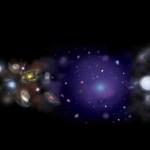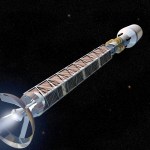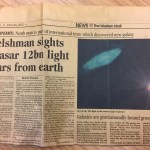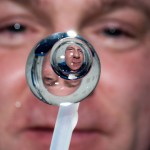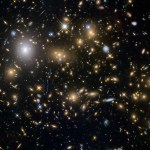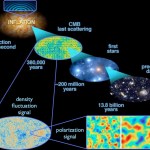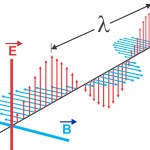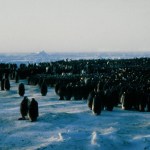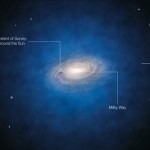Physics
“The joy of life consists in the exercise of one’s energies, continual growth, constant change, the enjoyment of every new experience. To stop means simply to die. The eternal mistake of mankind is to set up an attainable ideal.” -Aleister Crowley
As we learn more and more about the Universe, we'd like to describe it as simply as possible. While we have thousands or even millions of chemical configurations, they arise from less than 100 different atoms. Atoms themselves are made up of protons, neutrons and electrons. The great hope of unification and for fans of elegance in general is that…
"The only man who never makes a mistake is the man who never does anything." -Theodore Roosevelt
Scientists make mistakes. We fail. We have our intuition lead us astray; we synthesize information in ways that lead to catastrophically wrong predictions. Whether we make sloppy, calculational errors, have oversights in what we consider, or whether we simply engage in motivated reasoning to attempt to reach our desired conclusions, even the greatest of us make mistakes. Even Einstein.
Niels Bohr and Albert Einstein together in 1925, engaging in their famous conversations/debates about quantum…
"I think that Walter Schirra aboard Mercury 8 was the first of the astronauts to use the code name 'Santa Claus' to indicate the presence of flying saucers next to space capsules." -Maurice Chatelain
Well, here we are: December 25th, Christmas day, here at Starts With A Bang! Whether you're a Santa, a Scrooge or anywhere in between when it comes to the generosity of your holiday spirit, I've got some good things for you. First, there's a brand new Starts With A Bang podcast for you to enjoy, on whether our Universe itself could be the inside of a black hole.
And second, as…
“The very closest stars would require many years to visit, even traveling at the speed of light, which is impossible according to Einstein’s theory of relativity. Today’s fastest spaceships would require 200,000 years to travel to Alpha Centauri, our closest bright star. The energy required to send a hundred colonists to another star, as Frank Drake has pointed out, would be enough to meet the energy needs of the entire United States over a human lifetime. And these estimates are regarding nearby stars. When we consider the distances across the entire galaxy, and between galaxies,…
Ok, I confess, I was supposed to get these reviewed before the Holidays, but a Sequence of Unfortunate Events Intervened and I am only part way through these.
Anywho, if you need a last second pressie for random acquaintances so disposed, there are a couple of interesting science books out there:
A Fortunate Universe: Life in a Finely Tunes Cosmos by Geraint Lewis and Luke Barnes, is a nice up to date book for the general (educated) public on modern physics and cosmology.
If covers modern cosmology and some of the Big Questions of our times, in particular the issue of anthropomorphism how…
“You can’t cross the sea merely by standing and staring at the water.” –Rabindranath Tagore
You can’t answer a hypothetical question for certain, at least in science, without doing the experiment for yourself. Here on Earth, liquid water is plentiful; our planet has the stable temperatures and pressures that water needs to exist in its liquid state. Other planets aren't so lucky: with a thin or negligible atmosphere, you can only have solid ice or gaseous water vapor.
The gravitational pull on the gases in our atmosphere cause a substantial surface pressure, giving rise to liquid oceans…
“If antimatter and matter make contact, both are destroyed instantly. Physicists call the process ‘annihilation.” -Dan Brown
Antimatter is the counterpart to matter: it exists with the same mass, opposite charge, and if ever the two should touch, they annihilate away into pure energy via Einstein’s E = mc^2. But there are a great many properties of antimatter that we haven’t yet measured due to how much energy it takes to create it and how difficult it is to contain.
The particles and antiparticles of the Standard Model. Image credit: E. Siegel.
As we continue to make advances on this…
"Just to clarify, neither Jason or myself ... are advocating that it is an alien megastructure, but we also can't completely rule it out." -Kimberly Cartier
When we launched the Kepler spacecraft, we expected that we’d be able to measure the light from over 100,000 stars at once, practically continuously, over the timespan of many years. We discovered a number of planets, variable stars and eclipsing binaries, including many of the most Earth-like planets ever. But one star stands out as unique: Tabby’s star.
The flux, including the dips, in KIC 8462852, exhibiting unprecedented dimming and…
"Because philosophy arises from awe, a philosopher is bound in his way to be a lover of myths and poetic fables. Poets and philosophers are alike in being big with wonder." -Thomas Aquinas
Sure, you've studied a little physics. You know about Einstein and General Relativity, the quantum nature of the Universe and the fundamental particles and their interactions. You know about the Big Bang, and you've read up on the latest theories and ideas. So how did you wind up believing in many (or even all) of these scientific myths out there?
Light and ripples in space; as the light passes through non…
"Each ray of light moves in the coordinate system 'at rest' with the definite, constant velocity V independent of whether this ray of light is emitted by a body at rest or a body in motion." -Albert Einstein, 1905
The more kinetic energy you impart to something, the faster you go. But there’s a limit: the speed of light in a vacuum. In fact, if you have any mass at all, you’ll never reach it; if you have no mass, it’s the only speed you can travel at. But why is it finite instead of infinite? Why does it have the particular value it has? And why couldn’t it be faster or slower under different…
“First, you should check out my house. It’s, like, kinda lame, but way less lame than, like, your house.” -Lumpy Space Princess, Adventure Time
Billions of years ago, before the Universe contained clusters, galaxies, stars or even neutral atoms, everything was uniform. Almost perfectly uniform, where the densest regions weren’t even 0.01% denser than average. Over billions of years, those overdense regions have attracted more and more matter and grown under the influence of gravity.
Both simulations (red) and galaxy surveys (blue/purple) display the same large-scale clustering patterns.…
"October extinguished itself in a rush of howling winds and driving rain and November arrived, cold as frozen iron, with hard frosts every morning and icy drafts that bit at exposed hands and faces." -J.K. Rowling
As cold as it gets outside over the coming months, particularly with the effect of a displaced polar vortex in play, there’s another factor that can make it feel even colder: the wind. Coupled with extremely cold temperatures, the Windchill factor can exacerbate this tremendously, stripping the heat from your body and putting you at risk of various cold-related traumas.
Collisions…
"We are not the same persons this year as last; nor are those we love. It is a happy chance if we, changing, continue to love a changed person." -W. Somerset Maugham
After 13.8 billion years have gone by, you might not think that a year makes much of a difference. A year to the Universe is like 0.2 seconds -- the literal blink of an eye -- to a human being. Yet even though changes might be gradual, they’re real, and they very much add up over time.
A region of the Orion Nebula, one of the largest and most rapidly-star-forming regions where star birth takes place. Image credit: NASA, ESA and…
"It is worthy of notice that in Table VI the brighter variables have the longer periods. It is also noticeable that those having the longest periods appear to be as regular in their variations as those which pass through their changes in a day or two." -Henrietta Leavitt
The past year has held a slew of victories and defeats, positives and negatives and everything in between for us all. Don’t lament the bad; instead, set yourself up to enter 2017 with something wonderful in hand: an appreciation of the wonder of the natural Universe.
Incredible Stories from Space, and the author with…
"We are inside this plasma,
and plasma is inside everything. It is incandescent
in the sun, and I am curious to know if you
are able to stop orbiting yourself around it even for a second." -Marieta Maglas
The phenomenon of solar flares has been understood qualitatively but not quantitatively for a long time. The Sun's magnetic field confines its plasma into thin sheets of electric current, and when the field changes, the lines split and reconnect, causing the plasma to be expelled at tremendous rates. This same physics underlies solar flares, Earth's aurora, laboratory plasmas and possibly…
"The bedrock nature of space and time and the unification of cosmos and quantum are surely among science's great 'open frontiers.' These are parts of the intellectual map where we're still groping for the truth - where, in the fashion of ancient cartographers, we must still inscribe 'here be dragons.'" -Martin Rees
In 2015, LIGO collected data from a total of three candidate gravitational wave events, all of which were announced and released in 2016. These events verified the great prediction of Einstein: that decaying orbits should emit gravitational radiation with specific magnitudes and…
“A thing may be of deeper impossibility than another, in the sense that you can be more deeply underwater–but whether you are five feet or five fathoms from the surface you are still all wet.” -Brian McGreevy
It's been a spectacular week of investigating the Universe and our knowledge about it here at Starts With A Bang! There were a great many of you wondering about parallel Universes over the past month, and that's exactly -- in the context of quantum physics and cosmic inflation -- what this past month's Starts With A Bang podcast was on. Check it out!
This past week also…
"I think there are a number of experiments that are thinking about how you could look in different frequency bands, and get a glimpse of the primordial gravitational wave background. I think that would be really revolutionary, because that would be your first glimpse at the very first instant of our Universe." -Dave Reitze, LIGO's executive director
Black holes are remarkable entities that have puzzled and fascinated us since they were first postulated long before Einstein developed his theory of relativity. One of their fundamental but bizarre properties is the fact that once something…
“There is nothing new to be discovered in physics now. All that remains is more and more precise measurement.” -Lord Kelvin
The particle physics ‘nightmare scenario’ was that the LHC at CERN would achieve its desired energies and collision rates, that it would find a single Higgs boson between about 120 and 140 GeV, and that it would see absolutely nothing else. No new particles, no bizarre decays, nothing that couldn’t be accounted for by the Standard Model. With the latest release, that’s exactly what’s happening.
The observed Higgs decay channels vs. the Standard Model agreement, with the…
"...axions are potentially detectable through their weak coupling to electromagnetism..." -Aaron Chou
We know, from hundreds of years of experience with the laws of physics, that momentum is strictly conserved, and therefore a reactionless drive is impossible. What's not impossible is an engine that has a reaction that's simply invisible, or otherwise undetectable to us. This has been seen in experiments involving neutrinos, but NASA's impossible space engine, the EMdrive, offers another possibility: a dark matter reaction.
Image credit: ESO/L. Calçada, of the illustration of the dark matter…
